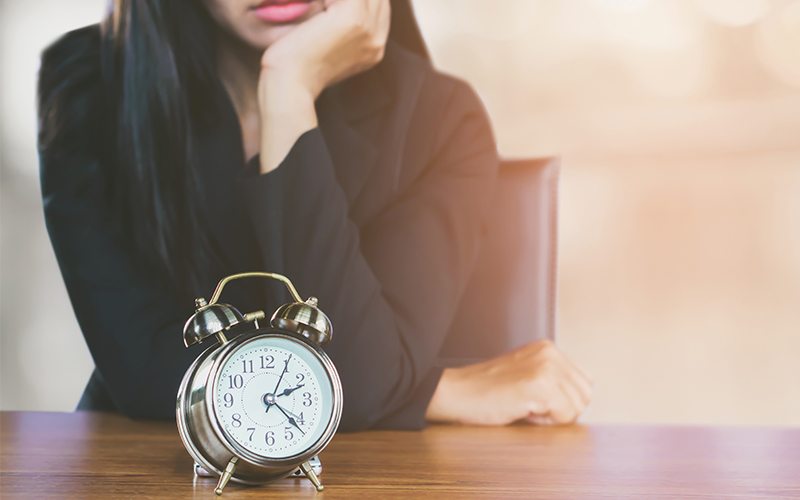
Content derived from DocTalk video with psychotherapist Jamie Friddle, LMHC
The act of waiting doesn’t come easily for most people, regardless of age or wisdom. Think of a small child waiting for a play date with their best friend, a student awaiting their grades on a recent exam, or an adult waiting for results of important bloodwork from their physician. Humans strive for routine, certainty and being able to plan for the future.
The pandemic has been a period of waiting—along with added stressors, life changes with jobs, schooling, and being apart from loved ones. Anxiety and uncertainty tend to appear in our lives when we don’t feel confident in our knowledge of what’s going on. We don’t want to think about not getting our job back or the possibility of our partner contracting COVID-19. We are waiting for the end of the pandemic, and not knowing what life will look like at that point can make it even more difficult. Many of us are looking forward to the feelings of relief and peace when we can again enjoy familiar routines.
What are we waiting for and why is waiting so hard? During the COVID-19 pandemic, we have all been faced with what VMC psychotherapist, Jamie Friddle, LMHC, calls an open waiting loop. This is a waiting period taking place for an unknown length of time with an unknown outcome. In contrast, a closed waiting loop is a waiting period lasting a known amount of time with a known outcome. Open waiting loops, like the pandemic, can often feel harder to bear because there are more unknown details. With the pandemic, Jamie Friddle says, “It’s almost like we are on a plane ride and we have no idea when we are going to land, where we are going to land, and if we will land safely.”
Kate Sweeny, PhD, and professor of psychology at University of California Riverside has studied the effects of people having to wait during both open and closed waiting periods. She confirms that open waiting periods are extra difficult because there is so much uncertainty–not knowing when the period will end or what the outcome will be. Other factors can complicate waiting and make these times feel more intense, including wishing for a specific length of time or result.
What can make waiting easier? Here are some tips to ease the uncertainty and make waiting a bit easier:
- While waiting, look forward to a silver lining. Poet John Keats discussed the idea of negative capability, which is the skill to accept uncertainty for a long period of time and make use of it in some way. To make this time worthwhile, we don’t have to start a tough new exercise program or become fluent in a new language. Look for any potential benefits that could come from this time period, and try to do so ahead of the outcome. This tactic comes from researchers on trauma and loss, who found that finding something positive in the experience ahead of time tends to help you feel better off in the end. Start to planand know what you’re going to do. For example, if you’re going through a job loss and had been looking at career alternatives before, can you finally switch careers or re-train for something you’ve really wanted to do for a long time?
- Find activities to put you in a state of flow. People in open waiting loops tend to do better when they are fully involved in something so that they can achieve a state of flow. A state of flow is described as the feeling when you’re so absorbed in an activity that you don’t notice the time pass by. Dr. Sweeny studied the mental health of people quarantined in Wuhan, China and compared them with those not quarantined. The quarantined people who did activities to help them reach a state of flow had no difference in their mental health when compared to those not quarantined. In order to reduce some of the intensity of a difficult waiting period, Jamie Friddle suggests we identify activities or things that put us in a state of flow and do them often.
- Lose track of time. To find activities that put you in a state of flow, you might think about the following scenario: you have 10-15 minutes before you have to leave your house to go somewhere. What would you NOT start doing because you know that you’d lose track of time, potentially missing your set time to leave? In the case of open waiting periods, you want to lose track of time.
A state of flow will involve different activities for each person. What may put one person into a state of flow may not be an enjoyable activity for another person. Here are some examples of activities that some people may lose track of time doing and reach a state of flow:
- Puzzles
- Reading
- Working on a project
- Art
- Gardening
- Sports
- Photography
- Sewing
During long periods of uncertainty, if we are able to look forward to potential silver linings, enjoy the present moment in a state of flow, and lose track of time, waiting becomes easier. If you still find you are suffering some physical symptoms such as shortness of breath, not sleeping well, or extreme feelings of anxiety, please talk to your primary care provider. They may offer other treatment ideas to help you through this difficult waiting period.

